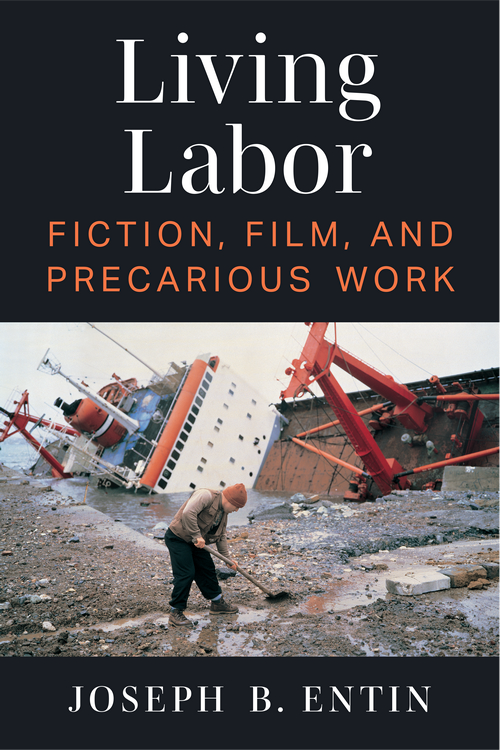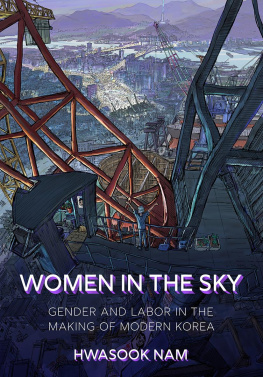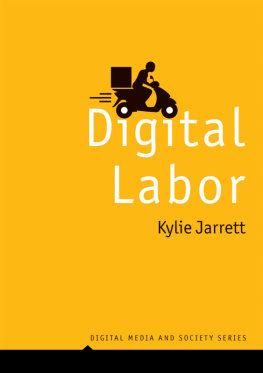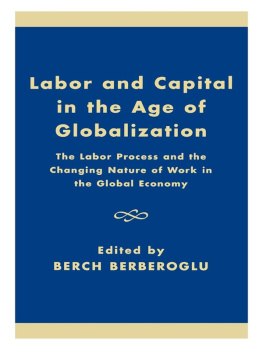
Page i Living Labor
Page ii Class : Culture
Series Editors
Amy Schrager Lang, Syracuse University, Bill V. Mullen, Purdue University, and Kasturi Ray, San Francisco State University
Recent Titles in the Series:
Living Labor: Fiction, Film, and Precarious Work
Joseph B. Entin
Sit-Down: The General Motors Strike of 19361937
Sidney Fine, with a new foreword by Kim Moody
Strike for the Common Good: Fighting for the Future of Public Education
Rebecca Kolins Givan and Amy Schrager Lang, Editors
Clothed in Meaning: Literature, Labor, and Cotton in Nineteenth-Century America
Sylvia Jenkins Cook,
Of Vagabonds and Fellow Travelers: African Diaspora Literary Culture and the Cultural Cold War
Cedric R. Tolliver
Dirty Work: Domestic Service in Progressive-Era Womens Fiction
Ann Mattis
Dialectical Imaginaries: Materialist Approaches to U.S. Latino/a Literature in the Age of Neoliberalism
Marcial Gonzlez and Carlos Gallego, Editors
The Half-Life of Deindustrialization: Working-Class Writing about Economic Restructuring
Sherry Lee Linkon
Middle Class Union: Organizing the Consuming Public in PostWorld War I America
Mark W. Robbins
The Poverty Law Canon: Exploring the Major Cases
Marie A. Failinger and Ezra Rosser, Editors
Dreams for Dead Bodies: Blackness, Labor, and the Corpus of American Detective Fiction
Marie A. Failinger and Ezra Rosser, Editors
Anti-Imperialist Modernism: Race and Transnational Radical Culture from the Great Depression to the Cold War
Benjamin Balthaser
Black America in the Shadow of the Sixties: Notes on the Civil Rights Movement, Neoliberalism, and Politics
Clarence Lang
Dividing Lines: Class Anxiety and Postbellum Black Fiction
Andre N. Williams
Page iii Living Labor
Fiction, Film, and Precarious Work
Joseph B. Entin
University of Michigan Press Ann Arbor
Page iv Copyright 2023 by Joseph B. Entin
Some rights reserved

This work is licensed under a Creative Commons Attribution-NonCommercial-NoDerivatives 4.0 International License. Note to users: A Creative Commons license is only valid when it is applied by the person or entity that holds rights to the licensed work. Works may contain components (e.g., photographs, illustrations, or quotations) to which the rightsholder in the work cannot apply the license. It is ultimately your responsibility to independently evaluate the copyright status of any work or component part of a work you use, in light of your intended use. To view a copy of this license, visit http://creativecommons.org/licenses/by-nc-nd/4.0/
For questions or permissions, please contact um.press.perms@umich.edu
Published in the United States of America by the
University of Michigan Press
Manufactured in the United States of America
First published May 2023
A CIP catalog record for this book is available from the British Library.
Library of Congress Cataloging-in-Publication data has been applied for.
The University of Michigan Presss open access publishing program is made possible thanks to additional funding from the University of Michigan Office of the Provost and the generous support of contributing libraries.
ISBN 978-0-472-07519-5 (hardcover : alk. paper)
ISBN 978-0-472-05519-7 (paper : alk. paper)
ISBN 978-0-472-90314-6 (open access ebook)
DOI: https://doi.org/10.3998/mpub.11738099
Page v For my students
and
For Miriam and Rachel
Page vi Page vii Contents
Digital materials related to this title can be found on the Fulcrum platform via the following citable URL: https://doi.org/10.3998/mpub.11738099
Page viii Page ix Acknowledgments
When I look back over the long and at times difficult process of writing this book, I am filled with gratitude. Writing often feels solitary, but it never is. One writes in dialogue with others and with the support of family, friends, colleagues, and comrades. My interest in and understanding of labor can be traced back to my grandparents: my maternal grandmother worked long days in a farm kitchen, feeding and caring for family members and field hands; my maternal grandfather picked, sorted, and sold vegetables, and did everything else to keep a small family farm running; my paternal grandfather, an immigrant from Russia, sold stoves, choir gowns, and hunting camouflage to earn a living; my paternal grandmother worked stints as an executive secretary and a cosmetics and silverware salesperson, and labored as a mother and homemaker. From them all, I inherited a sense that labor makes and remakes the world, and remakes the people who work, too. Thank you to all the Bunces and Entins for their love and their labors.
I wrote Living Labor over the course of several years, during which I also collaborated with friends and colleagues on a range of other projectscoedited collections, special journal issues, union and other social justice struggles, coteaching experiments, and student programs. Those acts of collective labor sustained me, even as they took me away from work on this book, and reminded me how fortunate I am to have such stellar people in my orbit. For vital lessons in collective editing and writing, I am grateful to Liz Duclos-Orsello, Rebecca Hill, Jesse Schwartz, Belinda Wallace, Jocelyn Wills, Irvin Hunt, Kinohi Nishikawa, and Clare Callahan. In recent years, several editors, including Ichiro Takayoshi, Kevin McNamara, Christie Launius, Page x Leslie Bow, and Russ Castronovo, have supported my work, providing valuable feedback on my prose and ideas. I am grateful to all of them for their willingness to publish writing about the nexus of literature, class, and labor, which continues to be a neglected scholarly subject. Thanks to Immanuel Ness and Polina Kroik for publishing the first kernel of this book years ago. I am forever thankful for my editorial adventure with Sara Blair and Franny Nudelman, whom I cherish as both friends and mentors; their kindness continues to buoy me.
Many people have expanded and refined my thinking about the intersection of labor and culture, including Nicholas Coles and Paul Lauter, who generously edited an earlier version of chapter 2 and who have contributed so much to the study of working-class literatures; so many others, including but not only Larry Hanley, Janet Zandy, Sherrie Linkon, Michael Denning, Sujatha Fernandez, Sara Appel, Clare Callahan, Sonali Perera, Laura Hapke, Paula Rabinowitz, Bill Mullen, Amy Schrager Lang, Tillie Olsen, and Benjamin Balthaser have directly or indirectly inspired and improved my work. I am especially grateful to Sara Appel, Paula Rabinowitz, Benjamin Balthaser, and Sherrie Linkon for critical readings of versions of the manuscript of this book; their feedback improved it immeasurably. All faults are mine alone.
For funding that provided critical time for reflection, research, and writing, I am grateful to the PSC-CUNY faculty research program, which supported several summers of intellectual labor; the CUNY Graduate Centers Center for the Humanities, through which I participated in a terrific year-long seminar under the direction of Gunja SenGupta and Jessie Daniels, funded by the Andrew W. Mellon Foundation; the CUNY Graduate Centers Committee on Globalization and Social Change, where I spent a generative and genial year in the company of Gary Wilder and several dynamite faculty and student fellows; the Brooklyn College Wolfe Institute of Humanities and its then-director Robert Viscusi for a year-long fellowship during which a substantial portion of this book was drafted; the Brooklyn College Tow Research and Creativity Grant, which provided funds to support this books completion. An earlier version of chapter 1 appeared in
Next page





